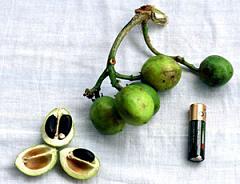 A company that breeds better seeds for biofuels has teamed up with a biotech company to sequence the jatropha genome … a plant touted as the possible future of biofuels feedstocks.
A company that breeds better seeds for biofuels has teamed up with a biotech company to sequence the jatropha genome … a plant touted as the possible future of biofuels feedstocks.
Officials at SG Biofuels have announced that they and Life Technologies Corporation have completed sequencing the Jatropha curcas genome to 100x coverage, using the SOLiD™ 4.0 System by Life Technologies:
The sequence significantly accelerates the identification of key traits for the oilseed-producing crop and advances its development as a high yielding, low-cost source for next generation biofuel.
Working in strategic alliance with Life Technologies, SG Biofuels will use the sequence to generate a high quality Jatropha reference genome. The genome will be compared to sequences generated from SG Biofuels’ germplasm library of more than 6,000 unique Jatropha genotypes – the largest and most diverse collection of Jatropha germplasm in the world – to identify molecular markers and trait genes to accelerate development of elite cultivars with vastly superior yields and profitability. This work will also advance the introduction of transgenic plants with further improved traits.
“The value of a Jatropha reference genome is enhanced significantly by having a diverse collection of plant material for comparison,” said Kirk Haney, President and Chief Executive Officer of SG Biofuels. “The sequence adds a powerful new tool to our development platform, allowing us to rapidly unlock the true potential of Jatropha as the most profitable and sustainable biofuel feedstock.”
“Working with SG Biofuels to sequence the Jatropha genome is an important part of our broader synthetic biology strategy to provide technologies for the development of next generation renewable energy,” said Wendy Jozsi, Director of Synthetic Biology at Life Technologies. “There is significant opportunity to use advanced molecular techniques in the optimization of plant-based biofuels, especially Jatropha, for increased yields and a faster development cycle, ultimately leading to new sources of energy.”
The non-edible jatropha is native to Central America and grown on marginal lands, providing a fuel source that does not compete with the food supply or the land to grow that food supply.

